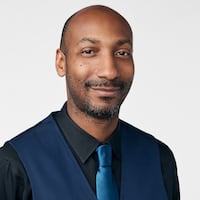The Elizabeth Taylor AIDS Foundation, The Sero Project, The Counter Narrative Project and Gilead Sciences hosted “Stuck in the ‘80s Night” on Feb. 28 at The Loft. The event was held to recognize HIV is Not a Crime Awareness Day.
HIV is Not a Crime Awareness Day was started in 2022 by Kamaria Laffrey, co-executive director of The Sero Project, which fights against social injustice. The organization partners with the Elizabeth Taylor AIDS Foundation and other grassroots organizations to unite against laws that use HIV status in criminal prosecution.
“These laws impact Black and brown communities and women,” Laffrey said. “This is a springboard to uplift and center both of those populations.”
Credit: Matthew Grimes
Credit: Matthew Grimes
The two-hour event featured classic hits, live performances, and calls-to action from various activists, journalists, entertainers, policy and health officials.
“Tonight is a combination of education, storytelling and fun,” said Barbara Berkowitz, officer for the Elizabeth Taylor AIDS Foundation. “It’s important to recognize that we are in Atlanta, an area heavily impacted by HIV. Bringing awareness to this issue is a priority.”
There were several discussions of ways to end stigmas and discrimination, and repealing laws currently existing in 35 states which criminalize individuals infected with HIV and AIDS.
Credit: Matthew Grimes
Credit: Matthew Grimes
The evening started with a few stories about how being infected with HIV and AIDS can have unjust consequences for Black men.
In 2007, Robert Suttle was involved in a sexual relationship with a man he met at a bar on New Year’s Eve in Shreveport, La.
Suttle says he shared his HIV status with his partner before their relationship ended. He was arrested in 2008 for intentional exposure to the AIDS virus, and eventually charged and convicted in 2009 for not disclosing his HIV-positive status.
“With certain issues, such as HIV, people get crazy and tend to react out of anger,” Suttle said.
He said he accepted a plea deal, fearing harsh legal consequences. He served six months in Louisiana state prison in 2010, and was ordered to register as a sex offender.
Suttle, now chair of Elizabeth Taylor AIDS Foundation’s Council of Justice Leaders, was working for the Louisiana Second Circuit Court of Appeals as an assistant clerk at the time of his arrest.
“The authorities came to my job to question me,” Suttle said during the panel. “I was arrested at work, my home was investigated [by authorities] looking for things that were related to HIV, or anything to confirm that I was HIV positive.”
Now living in New York, his record hasn’t been expunged. He is eligible for removal from the state’s sex registry in New York state in March of 2034.
Harold Phillips, former director of the Office of National AIDS Policy, mentioned some of the efforts that were made during his three years in the White House. In 2021, he helped draft President Biden’s National HIV/AIDS Strategy, released on December 1, or World AIDS Day, that challenged local and state legislatures to reform their HIV criminalization laws.
In May 2022, Georgia was among the states to reform its HIV criminal laws.
Phillips, who is HIV-positive, will become deputy director of programs for the National Minority AIDS Council on April 1. He encouraged the audience to research discriminatory laws that may exist in their regions and to educate their elected representatives.
“Policies are getting in the way of both our ability to get people into care and treatment as well as people finding out about their HIV status,” Phillips said.
“In cases where there has been no intent or no transmission of HIV, laws have been created out of fear and misinformation. We have to get out to vote, understand the positions of the candidates, and what’s at stake right now.”
Other guests shared how art can be used to create conversations and ignite change.
Actress Dominique Jackson, who starred as Elektra on the groundbreaking TV series “Pose,” spoke about how television programming themed around HIV and AIDS has changed since the early 1980s.
Featuring a cast of Black and brown actors who are all gay and transgender, “Pose” told stories loosely based on the early days of HIV and AIDS in New York City during the 1980s and ‘90s, and how the queer community was affected.
“Art takes the politics out of the issue and allows people to think about humanity,” Jackson said. “We have many things that will be thrown at us, but we can still be.”
The evening also featured musical performances, including a deejay set from Flavor Flav of Public Enemy that closed the evening.
In 1990, the activist hip-hop group recorded a skit, “Meet the G That Killed Me,” which tells the story of a person contracting HIV through drug needles and unprotected sex. It was among the earliest examples of a rap group delivering commentary on how the epidemic was affecting the Black community.
“At that time, AIDS was strong and brand new,” Flav said. “What we were trying to do with our music was prevent the spread of AIDS.”
Credit: Matthew Grimes
Credit: Matthew Grimes
Credit: Matthew Grimes
Credit: Matthew Grimes
About the Author





